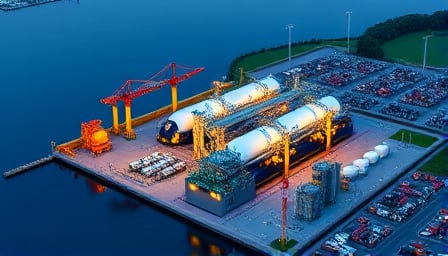Cheniere Energy Inc. Sees Stock Rise Amid Growing LNG Demand for Maritime Fuel
Cheniere Energy Inc. (NYSE: LNG), a prominent U.S. operator in liquefied natural gas (LNG) infrastructure, has achieved a 52‑week high in its share price after a year of moderate gains. The company’s core operations in Louisiana and Texas—primarily the Port Arthur LNG export terminal and the Sabine Pass LNG terminal—have benefitted from a sustained uptick in demand for LNG as a marine fuel.
Market Dynamics Driving Growth
Industry analysts project that LNG consumption for shipping will at least double by 2030. Two principal factors underpin this forecast:
Supply Availability – The U.S. has experienced a boom in LNG production, expanding its capacity to supply both domestic and international markets. New projects, such as the planned 6‑million‑tonne facility in Quebec, are expected to further increase global output, potentially providing a steady export stream to Europe.
Regulatory Pressure – Stringent emissions standards under the International Maritime Organization’s (IMO) 2020 sulphur cap and forthcoming climate initiatives have accelerated the shift from heavy fuel oil to cleaner alternatives like LNG. European ports, in particular, are investing heavily in LNG bunkering infrastructure to comply with these mandates.
Cheniere’s strategic positioning—owning and operating key export terminals and having established contracts with major shipping lines—positions the company to capture a larger share of this expanding market.
Cross‑Sector Connections and Broader Economic Implications
The LNG surge is not confined to the energy sector alone. Its ripple effects span maritime logistics, petrochemical manufacturing, and even renewable energy integration:
Maritime Industry: Shipping companies are reconfiguring fleets and investing in LNG bunkering facilities. This trend creates ancillary demand for LNG carriers, enhancing the overall logistics chain in which Cheniere participates.
Petrochemicals: LNG serves as a feedstock for chemicals such as ethylene and ammonia, linking Cheniere’s output to downstream industrial activities.
Energy Transition: By providing a lower‑carbon alternative to conventional fuels, LNG supports broader decarbonization goals across multiple sectors, including aviation and power generation.
These interconnected dynamics elevate LNG from a niche commodity to a pivotal component of the global energy transition narrative.
Recent Developments and Their Potential Impact
Several key events could further influence Cheniere’s operational outlook and share valuation:
| Development | Relevance to Cheniere | Potential Impact |
|---|---|---|
| Quebec LNG Facility Proposal | Potential to increase North American LNG output, creating additional export capacity | Enhances supply reliability, potentially lowering export costs and boosting margins |
| EU’s Continued LNG Dependency | Europe’s reliance on LNG as a bridge fuel maintains demand for U.S. exports | Sustains long‑term contract volumes for Cheniere’s terminals |
| Hungary’s Long‑Term LNG Contract with a French Company | Diversification of European buyers, opening new market corridors | Strengthens geopolitical stability of LNG trade, supporting higher pricing power |
These events collectively reinforce a favorable environment for Cheniere’s LNG export strategy, as the company can leverage its existing infrastructure to meet burgeoning demand.
Stock Performance and Outlook
While Cheniere’s shares have reached a 52‑week peak, recent trading sessions have exhibited relative stability with no significant volatility. This steadiness suggests that market participants are cautiously optimistic, awaiting further confirmation of the sector’s upward trajectory. Analysts advise that:
- Short‑Term: Volatility may remain muted as the company completes contractual negotiations and monitors regulatory developments in key markets.
- Long‑Term: Sustained growth in LNG demand for marine fuel, coupled with expanding export infrastructure, could propel further share appreciation.
In conclusion, Cheniere Energy’s strategic focus on LNG export and its alignment with global maritime decarbonization trends position it well to benefit from evolving market forces. The confluence of regulatory pressure, supply expansion, and cross‑sector integration underscores the company’s resilience and potential for continued shareholder value creation.
